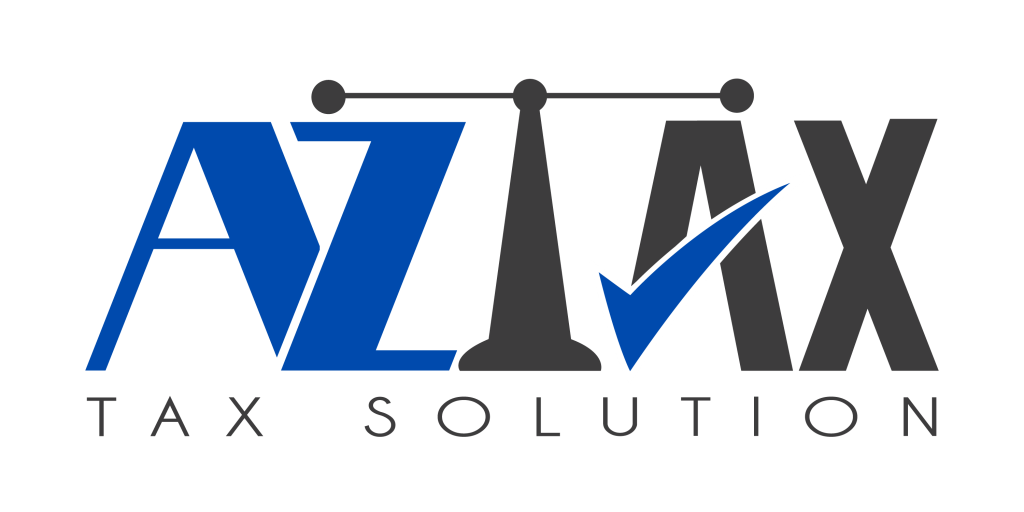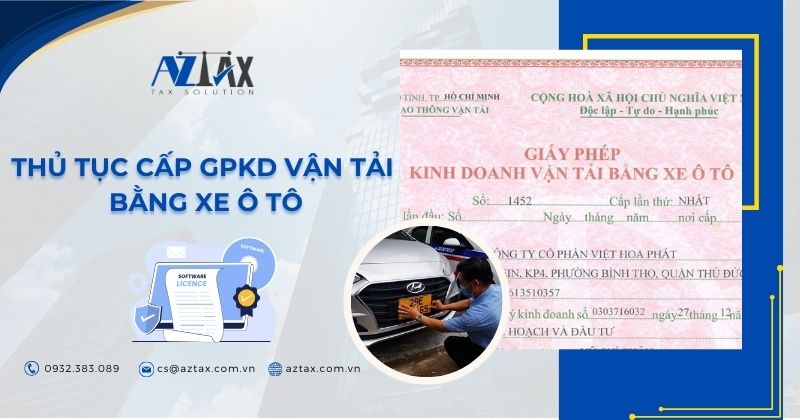Exploring business opportunities in Vietnam as a foreigner unveils a vibrant landscape amid its growing economy. This article delves into the intricacies of starting a business in Vietnam as a foreigner in this dynamic environment, outlining key considerations, advantages, and potential business challenges in Vietnam for prospective entrepreneurs. Let’s read with AZTAX.
1. Can foreigners start a business in Vietnam?
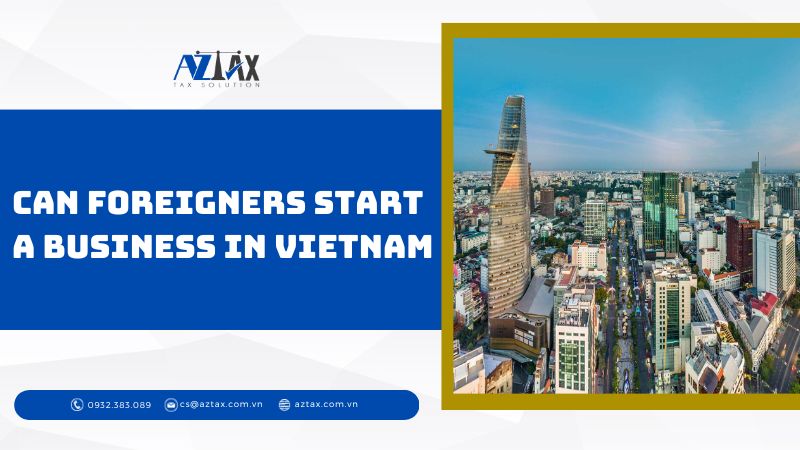
Absolutely! You can start a business in Vietnam as a foreigner, through direct or indirect foreign investments.
Direct foreign investment involves collaboration with a Vietnamese partner to establish either a 100% foreign-owned company or a joint venture. To secure a direct investment in Vietnam, obtaining an enterprise license and navigating through legal procedures in accordance with local laws is imperative.
On the flip side, indirect foreign investment entails acquiring shares in Vietnamese companies. This form of investment provides you with a managerial role within the company, contingent upon the terms agreed upon with the Vietnamese entity.
Continue reading to gain insights into prevalent forms of business investment and essential considerations when starting a business in Vietnam for a foreigner!
2. How to start a business in Vietnam as a foreigner?
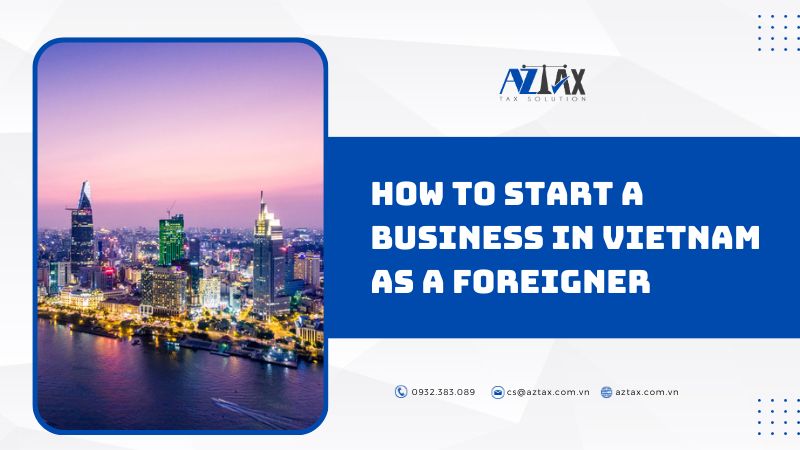
2.1. How to apply for a company in Vietnam
Obtaining an Investment License:
- The initial phase of setting up a business in Vietnam involves securing an Investment Registration Certificate (IRC). The application undergoes scrutiny by the Department of Planning and Investment. The relevant licensing authorities for IRC applications vary:
- For investment projects outside industrial zones, export processing zones, high-tech zones, and economic zones, the licensing authority is the provincial people’s committee (Department of Planning and Investment).
- Investment projects within industrial zones, export processing zones, high-tech zones, and economic zones fall under the purview of the provincial industrial zone management authority or economic zone management authority.
- Typically, it takes a minimum of 15 days for approval of the Investment Registration Certificate.
- Note: Investments not meeting the criteria for foreign ownership exceeding 51% of charter capital are exempt from the IRC requirement.
Application for Enterprise Registration Certificate (ERC):
- Subsequent to IRC approval, the next step involves obtaining a Business/Enterprise Registration Certificate (ERC) from the provincial Department of Planning and Investment, regardless of the project’s location. ERC applications are usually processed within 3 working days. However, specific investment projects falling under “conditional” sectors necessitate additional licensing procedures and scrutiny by relevant government ministries before approval.
Examples of “conditional” investment businesses, per Appendix 4 of the Law on Investment, include activities like making seals, securities trading, trading in supporting tools and repair services, accounting/auditing services, security services, insurance-related businesses, and consultancy services in regulated sectors.
Generally, specific documents are required for business setup in Vietnam, contingent on the chosen business structure.
NOTE: For Branch or Representative Offices In instances where foreign companies opt for a branch or representative office setup in Vietnam, IRC and ERC applications are replaced with Branch/Representative Office License applications. The application process typically takes 7 working days or longer, overseen by the provincial Department of Industry and Trade.
Foreign investors are encouraged to enlist the assistance of a reliable incorporation service firm for comprehensive guidance on the necessary submissions corresponding to their chosen business entity type in Vietnam when starting a business in Vietnam as a foreigner.
2.2 Learning business culture in Vietnam
Understanding the business culture in Vietnam is crucial for foreign entrepreneurs embarking on starting a company in Vietnam. Business culture is regarded as the essence of an enterprise, exerting influence over production activities, business decisions, and both internal and external relationships. It encompasses perceptions, objectives, and cultural values that permeate every aspect of business operations.
Vietnam, situated in the Eastern cultural region of the Southeast, boasts a distinctive agricultural culture rooted in Eastern traditions. Navigating the business landscape in Vietnam involves recognizing and adapting to various cultural norms:
- Introduction and Personal Information: When meeting Vietnamese partners, initiating the conversation with a self-introduction is customary. It’s common for them to inquire about your age as a way of determining roles in the conversation, given the abundance of personal pronouns in the Vietnamese language.
- Gift-Giving Tradition: Gift-giving is a highly valued cultural expression in Vietnam. Especially during the Tet holiday, presenting gifts and greeting cards to partners and associates is customary and appreciated.
- Socializing over Meals: Sharing meals is a fundamental aspect of community and business activities in Vietnam. Engaging in dinners with local representatives or customers fosters relationship-building and strengthens connections with local partners.
- Drinking Etiquette: The manner of drinking in social settings is distinctive. Drinking alone is considered impolite, and the custom is to drink only after toasting. This social ritual is an integral part of Vietnamese culture.
- Communication Style: During negotiations, Vietnamese counterparts often use expressions like “we will consider” or “we will answer.” To expedite decision-making, it is advisable to provide all necessary documents before meetings, particularly when dealing with state agencies, ensuring documents are in Vietnamese.
- Negotiation Approach: The initial stages of negotiations often involve unrelated topics as a means of ‘creating atmosphere.’ Patience is essential, and it’s advised not to bring up legal matters or mention lawyers early in discussions, as Vietnamese counterparts may be averse to these aspects.
- Pace of Business: Vietnamese entrepreneurs may exhibit a deliberate pace in responding to business situations. The relaxed attitude towards time, often referred to as “rubber hours,” is a common characteristic among modern Vietnamese individuals.
2.3 Learning laws in Vietnam
Staying abreast of updates to the Law on Investment and the Law on Enterprises is crucial when considering starting a business in Vietnam as a foreigner.
The enactment of the Law on Investment and the Law on Enterprises in 2020 has established a comprehensive legal framework governing the involvement of foreign investors in Vietnam’s business landscape. This framework aims to enhance the investment environment, fostering a fair and competitive atmosphere while safeguarding national security.
Under the current legal provisions, foreign investors exploring business opportunities in Vietnam have two primary options for initiating business ventures with foreign elements:
Option 1:
- Initiate the process by obtaining the first Investment Registration Certificate, applicable to both 100% foreign-invested enterprises and joint-venture enterprises. Subsequently, follow through with the necessary procedures to secure a Certificate of Registration of Enterprise.
Option 2:
- Opt for investment through capital contributions or the purchase of shares in Vietnamese companies. Subsequently, actively participate in managing the company as agreed upon by the involved parties.
- Each of these options presents distinct advantages and disadvantages, encompassing considerations related to conditions, administrative procedures, and governance matters throughout the implementation of investment projects in Vietnam.
- Remaining informed about the intricacies of these legal frameworks is essential for foreign investors seeking to navigate the complexities of starting and managing businesses in Vietnam effectively.
2.4 Considering an appropriate business structure for foreigners
Foreigners seeking to open a business in Vietnam can opt for one of two legal entities: a Limited Liability Company (LLC) or a Joint-Stock Company (JSC). An LLC can be formed with just one or two shareholders, whereas a JSC mandates a minimum of three shareholders.
2.5 Dealing with tax matters when starting a international business in Vietnam
Regardless of the business structure you operate in Vietnam, adhering to tax obligations is imperative. Several key taxes apply to businesses across the country:
- Corporate Income Tax (CIT):
- Applicable at a rate of 20% to the company’s profits generated in Vietnam.
- Personal Income Tax (PIT):
- Ranges from 5% to 35% for local residents.
- For non-residents, a flat rate of 20% applies to income earned in Vietnam.
- Value-Added Tax (VAT):
- Applicable rates include 0%, 5%, and 10%, depending on the nature of goods and services utilized for production, business, and consumption within Vietnam.
- Foreign Contractor Withholding Tax (FCT):
- Varied tax rates, specific to the business sector, apply to entities or individuals conducting business and earning income from Vietnam under agreements with Vietnamese parties.
In essence, the four primary taxes to be mindful of are Value Added Tax (VAT), Corporate Income Tax (CIT), Personal Income Tax (PIT), and Foreign Contractor Tax (FCT).
Despite these tax obligations, numerous tax reliefs are available to mitigate tax liabilities in Vietnam. Consider the following options:
- CIT: Preferential tax rates and tax holidays are available.
- PIT: Allowable deductions include contributions to compulsory insurance, charitable contributions, and family-related deductive relief.
- VAT: Exemptions may apply to specific businesses.
- FCT: Dividends of overseas corporate shareholders are not subject to withholding tax.
3. Advantages and disadvantages of starting a business in Vietnam as a foreigner

3.1 Advantages of doing business in Vietnam
Growing Economy: The initiation of “renovation” policy in 1986 marked the beginning of Vietnam’s modernization and competitiveness. This shift facilitated the country’s transformation from an agrarian to a more industrial market-based economy. Despite the challenges posed by the Covid-19 pandemic, Vietnam’s economy unexpectedly expanded in the second quarter of 2020.
Developing Infrastructure: Fueled by the needs of its population and increasing trade, Vietnam is undergoing a notable construction boom to enhance its infrastructure. The construction sector, vital for the country’s competitiveness, receives substantial support from the Vietnamese government.
Manufacturing Investments: Vietnam has strategically invested in manufacturing, particularly in electronics, making it one of the leading contributors to the country’s GDP (16.5% in 2019). In this fiercely competitive sector, Vietnam competes favorably with established players in the region.
Ease of Doing Business: In a bid to attract foreign investment and promote entrepreneurial development, the Vietnamese government has implemented significant changes to the country’s regulatory business environment. These enhancements have streamlined business operations in Vietnam. Presently, the World Bank recognizes Vietnam as one of the most improved countries, particularly in areas such as:
- Reducing the cost of starting a business
- Enhancing the accessibility of information and notifications online
- Lowering employers’ contributions to the labor fund tax
- Eliminating the requirement for hard copies of VAT returns, which can now be submitted electronically.
These factors collectively contribute to Vietnam’s appeal as an increasingly favorable destination for business ventures, offering a growing economy, robust infrastructure development, a thriving manufacturing sector, and an improved and accommodating business environment.
3.2 Disadvantages of starting a business in Vietnam as a Foreigner
Foreign Ownership Regulations: Despite the growing advantages, Vietnam imposes stringent regulations on foreign ownership. Only specific types of businesses can be 100% foreign-owned, while others necessitate a Vietnamese joint venture partnership. In cases where there are no World Trade Organization (WTO) agreements or local laws governing foreign ownership for a particular business line, ministry-level approval becomes a requisite.
Lengthy Registration Process: Registering a company in Vietnam is a multistep process, which can be time-consuming. The duration ranges from one to four months, contingent on the nature of the business. Initiating with the application for an Investment Registration Certificate, the process takes up to a month. Subsequently, obtaining a Business Registration Certificate adds another week, and additional licenses may be required based on the business’s nature.
Status as a Developing Country: Despite various incentives and a positive outlook for foreign businesses, Vietnam remains a developing country. Infrastructure and telecommunications networks are subject to restrictions compared to neighboring countries like Thailand. While Vietnam shows promise, there are constraints in these areas, reflecting the country’s ongoing developmental phase.
4. Cost of starting a business in Vietnam as a foreigner
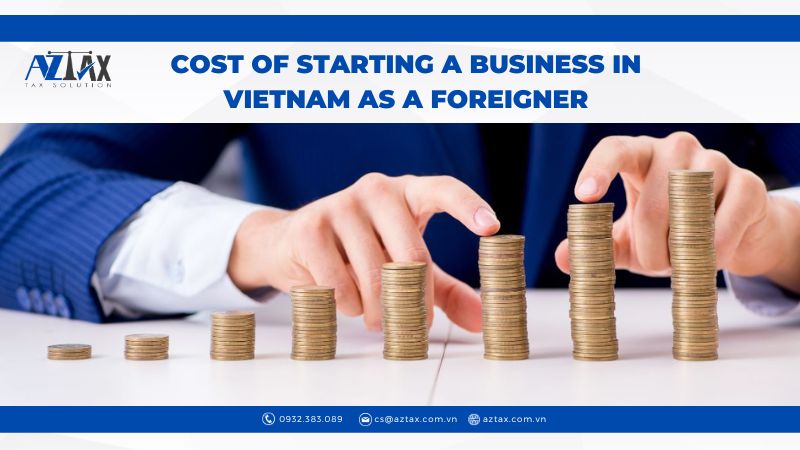
Business start-up service providers are available in various forms and price brackets. From our experience, the correlation between cost and quality is often evident. We advocate for considering a reasonable budget when opening a business in Vietnam for foreigners, typically ranging from USD 1,250 to 2,000 for a foreign-owned business.
These estimates reflect our assessment of fair and customary costs associated with business registration services, keeping in mind the specific needs and complexities associated with foreign-owned and Vietnamese-owned companies
5. Conclusion
Embarking on the journey of starting a business in Vietnam as a foreigner offers a plethora of opportunities amidst a dynamic economic landscape. The country’s robust growth, supported by initiatives like the “doi moi” policy and significant investments in infrastructure and manufacturing, creates an environment ripe for business ventures. While challenges such as foreign ownership regulations and a lengthy registration process exist, the Vietnamese government’s efforts to streamline the business environment demonstrate a commitment to fostering a more accessible landscape for foreign investors.
Navigating the intricacies of Vietnam’s business culture, understanding tax obligations, and recognizing the advantages and disadvantages are crucial steps for a successful venture. With the right knowledge, strategic planning, and an appreciation for the unique aspects of doing business in Vietnam, foreign entrepreneurs can tap into the nation’s potential and contribute to its ongoing economic evolution. Ultimately, the allure of Vietnam lies in its promising market, ongoing development, and a government committed to creating a conducive environment for international business endeavors.
Hopefully with the above content you can understand more about starting a business in Vietnam as a foreigner. If you have any questions, please contact AZTAX for the best support.



